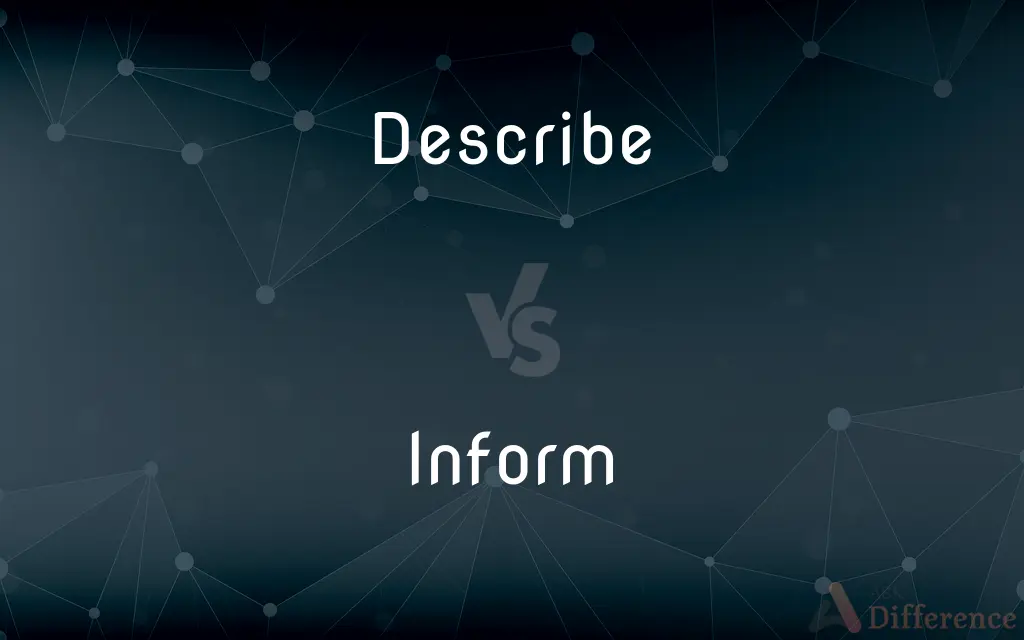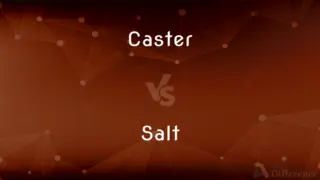Describe vs. Inform — What's the Difference?
By Tayyaba Rehman & Urooj Arif — Updated on April 28, 2024
"Describe" involves giving a detailed account or picture of a situation, event, or concept, often with vivid language, while "inform" means to provide facts or data clearly and directly without embellishment.

Difference Between Describe and Inform
Table of Contents
ADVERTISEMENT
Key Differences
When someone describes something, they often elaborate on details, using sensory information to paint a vivid picture. On the other hand, to inform someone involves conveying information or facts straightforwardly, aiming for clarity and understanding rather than evocation.
Describing a scene might include details about colors, sounds, and emotions to give the listener a full sensory experience. Whereas, informing about the same scene would focus more on the factual elements, such as the time, location, and events that occurred, without the embellished details.
The purpose of description is often to evoke an image or emotion, making it a common technique in creative writing and storytelling. Conversely, the aim of informing is to educate or update, making it essential in settings like news reporting, academia, and professional communication.
In educational contexts, teachers may describe a historical event with rich details to engage students' imaginations and help them visualize the period. On the other hand, they inform students about specific dates, figures, and outcomes to ensure they grasp the factual content necessary for academic assessments.
While descriptions can be subjective, reflecting the speaker's personal perspective or artistic vision, information is typically objective and seeks to avoid personal bias, focusing instead on verifiable facts and data.
ADVERTISEMENT
Comparison Chart
Purpose
Evokes sensory details
Provides factual information
Language Style
Vivid, detailed
Clear, direct
Common Contexts
Literature, arts
News, education, instructions
Objectivity
Can be subjective
Generally objective
Focus
Creating a mental picture
Delivering knowledge
Compare with Definitions
Describe
Often implies using descriptive language that appeals to the senses.
The novel describes the bustling market with such detail that you can almost smell the spices.
Inform
Often used in straightforward, clear communication.
Please inform the team about the meeting schedule.
Describe
To give an account of something in words, detailing characteristics and traits.
She described the sunset as a blend of orange and pink, like a watercolor.
Inform
To give knowledge or factual information to someone.
The doctor informed her patient about the treatment options.
Describe
Used in contexts where detail and depth are required to portray a scenario.
The guide described each historical artifact with great enthusiasm.
Inform
Essential in educational, professional, and technical settings.
The brochure informs visitors about park rules and safety.
Describe
Aims to convey a more comprehensive understanding through detailed imagery.
The poet describes the city's nightlife as vibrant and pulsating.
Inform
Focuses on delivering accurate, useful data.
The app informs users of real-time traffic updates.
Describe
Can involve personal perception and emotional input.
He described his first day at school as terrifying yet exciting.
Inform
Aims to ensure the receiver has the necessary information to make decisions or understand a situation.
The manager informed employees about the new company policies.
Describe
To give an account of in speech or writing
Describe a sea voyage.
Inform
Inform is a programming language and design system for interactive fiction originally created in 1993 by Graham Nelson. Inform can generate programs designed for the Z-code or Glulx virtual machines.
Describe
To convey an idea or impression of; characterize
She described her childhood as a time of wonder and discovery.
Inform
To impart information to; make aware of something
We were informed by mail of the change in plans. The nurse informed me that visiting hours were over.
Describe
To represent pictorially; depict
Goya's etchings describe the horrors of war in grotesque detail.
Inform
To acquaint (oneself) with knowledge of a subject.
Describe
To trace the form or outline of
Describe a circle with a compass.
Inform
To give form or character to; imbue with a quality or an essence
"A society's strength is measured by ... its ability to inform a future generation with its moral standards" (Vanity Fair).
Describe
(transitive) To represent in words.
The feeling is difficult to describe, but not unpleasant.
The geographer describes countries and cities.
Several witnesses describe seeing lights in the sky that night.
Inform
To be a formative or characterizing presence in; animate
"It is this brash, backroom sensibility that informs his work as a novelist" (Jeff Shear).
Describe
(transitive) To represent by drawing; to draw a plan of; to delineate; to trace or mark out.
To describe a circle by the compasses;
A torch waved about the head in such a way as to describe a circle
Inform
(Obsolete) To form (the mind or character) by teaching or training.
Describe
To give rise to a geometrical structure.
The function describes a very complex surface.
Inform
To give or provide information.
Describe
To introduce a new taxon to science by explaining its characteristics and particularly how it differs from other taxa.
The fungus was first described by a botanist.
Inform
To disclose confidential or incriminating information to an authority
The defendant informed against the other members of the ring.
Describe
(obsolete) To distribute into parts, groups, or classes; to mark off; to class.
Inform
To instruct, train (usually in matters of knowledge).
Describe
To represent by drawing; to draw a plan of; to delineate; to trace or mark out; as, to describe a circle by the compasses; a torch waved about the head in such a way as to describe a circle.
Inform
(transitive) To communicate knowledge to.
Describe
To represent by words written or spoken; to give an account of; to make known to others by words or signs; as, the geographer describes countries and cities.
Inform
(intransitive) To impart information or knowledge.
Describe
To distribute into parts, groups, or classes; to mark off; to class.
Passed through the land, and described it by cities into seven parts in a book.
Inform
To act as an informer; denounce.
Describe
To use the faculty of describing; to give a description; as, Milton describes with uncommon force and beauty.
Inform
(transitive) To give form or character to; to inspire (with a given quality); to affect, influence (with a pervading principle, idea etc.).
His sense of religion informs everything he writes.
Describe
Give a description of;
He drew an elaborate plan of attack
Inform
To make known, wisely and/or knowledgeably.
Describe
To give an account or representation of in words;
Discreet Italian police described it in a manner typically continental
Inform
To direct, guide.
Describe
Identify as in botany or biology, for example
Inform
To take form; to become visible or manifest; to appear.
Describe
Make a mark or lines on a surface;
Draw a line
Trace the outline of a figure in the sand
Inform
Without regular form; shapeless; ugly; deformed.
Inform
Without regular form; shapeless; ugly; deformed.
Inform
To give form or share to; to give vital or organizing power to; to give life to; to imbue and actuate with vitality; to animate; to mold; to figure; to fashion.
Let others better mold the running massOf metals, and inform the breathing brass.
Breath informs this fleeting frame.
Breathes in our soul, informs our mortal part.
Inform
To communicate knowledge to; to make known to; to acquaint; to advise; to instruct; to tell; to notify; to enlighten; - usually followed by of.
For he would learn their business secretly,And then inform his master hastily.
I am informed thoroughly of the cause.
Inform
To communicate a knowledge of facts to, by way of accusation; to warn against anybody.
Tertullus . . . informed the governor against Paul.
Inform
To give intelligence or information; to tell.
He might either teach in the same manner, or inform how he had been taught.
Inform
Impart knowledge of some fact, state or affairs, or event to;
I informed him of his rights
Inform
Give character or essence to;
The principles that inform modern teaching
Inform
Act as an informer;
She had informed on her own parents for years
Common Curiosities
Where would I likely encounter descriptive language?
Descriptive language is often found in literature, storytelling, and any artistic description that aims to evoke images and emotions.
Can describing and informing be used together?
Yes, in many contexts such as educational lectures or documentary scripts, both describing and informing are used together to both engage and educate the audience.
Which is more subjective, describing or informing?
Describing is generally more subjective, as it can incorporate personal perceptions and artistic expression, whereas informing aims to be objective and factual.
What is the main difference between describing and informing?
The main difference is that describing focuses on detailed, often sensory imagery to create a vivid picture, while informing is about providing clear, factual data.
What are some techniques for effective informing?
Clear language, focusing on essential facts, and structuring information logically are key techniques for effective informing.
Why is it important to know the difference between these two?
Understanding the difference helps in choosing the right communication style based on the purpose, whether it's to engage emotionally or to convey information efficiently.
Is informing always factual?
Informing should always aim to be factual, as its primary purpose is to convey accurate information.
Can you use descriptive language in business settings?
Yes, while it's less common, descriptive language can be used in business to enhance presentations, marketing materials, and to create a narrative around a product or company culture.
How do descriptive skills improve communication?
They enhance communication by making it more engaging and memorable, helping listeners or readers visualize and emotionally connect with the subject.
Is one method better than the other?
Neither method is universally better; the effectiveness depends on the context and the desired outcome of the communication.
What role does describing play in visual arts?
In visual arts, describing can help viewers understand and appreciate the deeper meanings and contexts behind visual elements.
How do I choose between describing and informing?
Consider your audience and your objective; use describing to engage and entertain, and informing to educate or instruct.
What impact does digital media have on informing and describing?
Digital media amplifies the reach and immediacy of both informing and describing, allowing for interactive and multimedia approaches to both.
What might be a drawback of overly descriptive language?
Overly descriptive language can sometimes obscure the main point or bore the audience if not relevant to their interests or needs.
How can I improve my informing skills?
Practice clarity in your communication, focus on the key facts, and organize your information logically to enhance understanding.
Share Your Discovery

Previous Comparison
Caster vs. Salt
Next Comparison
Tritagonist vs. AntagonistAuthor Spotlight
Written by
Tayyaba RehmanTayyaba Rehman is a distinguished writer, currently serving as a primary contributor to askdifference.com. As a researcher in semantics and etymology, Tayyaba's passion for the complexity of languages and their distinctions has found a perfect home on the platform. Tayyaba delves into the intricacies of language, distinguishing between commonly confused words and phrases, thereby providing clarity for readers worldwide.
Co-written by
Urooj ArifUrooj is a skilled content writer at Ask Difference, known for her exceptional ability to simplify complex topics into engaging and informative content. With a passion for research and a flair for clear, concise writing, she consistently delivers articles that resonate with our diverse audience.
















































